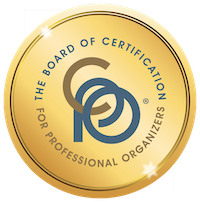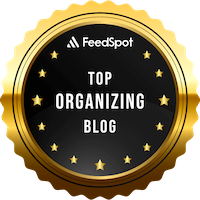Executive Function Deficit Disorder
Last Friday, I listened to a recording of a great talk from Ari Tuckman, a psychologist who specializes in working with folks with Attention Deficit/Hyperactivity Disorder (ADHD). The talk, called Organizing the ADHD Brain Using Executive Functions, was presented at this year’s National Association of Professional Organizers conference.
In the talk, Dr. Tuckman said that ADHD could more appropriately be called Executive Function Deficit Disorder, because that’s what it boils down to. (He also said that this name change would never happen, since advocates fought hard to get people with ADHD accommodated through the Americans with Disabilities Act.)

According to the website of the National Center for Learning Disabilities:
Executive Function is a set of mental processes that helps connect past experience with present action. People use it to perform activities such as planning, organizing, strategizing, paying attention to and remembering details, and managing time and space.
Or, as Dr. Tuckman puts it, “Our highest- level brain processes that enable us to make good decisions in a complex world.”
Dr. Tuckman is the author of the book More Attention, Less Deficit: Success Strategies for Adults with ADHD, which provides lots of great information on executive function. In fact, he made the first chapter of his book about executive function because it is so fundamental to any discussion of ADHD. That chapter available as a free sample download.
In that chapter he discusses eight executive functions and the implications of their deficit for those with ADHD.
- Response inhibition: Taking a pause to weigh options before making a decision
- Working memory: The part of the memory that holds information about what we’re doing in the present moment
- Sense of time: The ability to have a good sense of the passage of time
- Remembering to remember: The capacity to remind yourself to do the right thing at the right time
- Emotional self-control: Being able to objectively assess feelings and dilute them as appropriate.
- Self-activation: Using internal pressure to get the ball rolling on tasks
- Persistence of effort: Keeping going once you get going
- Hindsight and forethought: Using the past and future to guide the present
Thinking about people with ADHD not so much as distractible or fidgety but rather lacking the eight executive functions described above is very helpful to me.
If this interests you, I urge you to download the first chapter of More Attention, Less Deficit (and buy and read the rest of the book!). If you’re a professional organizer, you may benefit from listening to the talk, Organizing the ADHD Brain Using Executive Functions, which is available for download here at VW Tapes.
Dr. Tuckman also offers a free 10-minute podcast, available through iTunes, in which he discusses many of these principles.
Tagged with: add, ari tuckman, executive function
Comments
Links
- National Association of Productivity and Organizing Professionals
- NAPO St. Louis
- Getting to Good Enough podcast
- Are you interested in becoming a professional organizer?
- Shannon Wilkinson, life coach
- Institute for Challenging Disorganization
- Ravelry
- Peace of Mind Spending
- Organize Your Family History









Thanks for this heads up, Janine. I’ve gotten the podcast and the first chapter. His suggestions would go a long way toward destigmatizing ADHD.
Ann December 26, 2012 04:17 PM